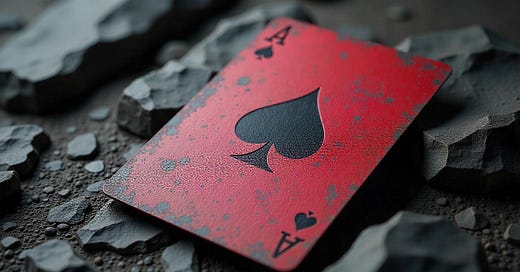China can play its critical minerals card to trump Trump's tariffs, Plus no end in sight for AstraZeneca's China troubles -- China Boss News 11.15.24
Newsletter -- Early reminder: China Boss will be on holiday for the Thanksgiving weekend (November 28th - December 1st).
What happened
China introduced long-awaited measures last week to address massive local government debt.
Beijing is loathe to "bail out" local governments overwhelmed by debt from land projects financed by extensive borrowing for fear it will reward reckless spending and corruption and result in financial dependence on the central government.
But with the prospect of China's economy hanging in the balance, it has overcome some of its hesitancy.
Why now?
China is staring down the barrel of Trump's campaign promises to impose 60% tariffs on trade.
We are still determining what the tariffs will look like when Trump takes office, but Beijing is worried.
According to Reuters, the government's latest plan includes an investment of 10 trillion yuan ($1.4 trillion) to alleviate local government financing issues and support struggling economic growth.
Experts told Reuters that it was a new approach and signaled a shift from previous stimulus methods, focusing on strengthening municipal finances rather than directly boosting the economy.
Nonetheless, investors expecting a significant fiscal boost will likely be disappointed as analysts believe the current measures mainly replace existing debts rather than facilitate new economic activity.
Why it matters
Better prepared
Trump's proposed tariffs on Chinese goods complicate China's long-term growth outlook.
Beijing's recently announced package permits local governments to raise their debt quota by 6 trillion yuan ($829 bn) over three years to settle "hidden debts." It also allows 4 trillion yuan ($553 bn) in pre-approved issuance for the same purpose.
The problem is that the best estimates of China's hidden debt monstrosity range between $7 trillion and $11 trillion.
Again, that's the amount of hidden debt that must be added to the $9.8 trillion, or 69% of GDP, that officials already know about.
Sure makes China's $3 trillion forex reserves "war chest" look a bit paltry, doesn't it?
At any rate, suffice it to say that China's local government debt seems worse than a 🧟 zombie apocalypse, and even Beijing’s economists agree that a lot more than 10 trillion yuan ($1. 40 trillion) is needed to stave off a significant, widespread, and prolonged downturn.
So, why isn't Beijing heeding their advice?
After all, a second Trump term may bring new economic pain if it hobbles the exports used as a crutch for the failing property sector, which comprises nearly 30% of GDP.
Because Chinese policymakers see other options.
When Donald Trump initiated a trade war with China in 2018, China was woefully unprepared.
US policy suddenly lurched from engagement to confrontation. China was forced to agree to buy $200 billion of American goods to address the trade imbalance, even though it ultimately did not meet those targets.
Now, however, experts say Xi Jinping is more ready to face Trump headwinds.
According to Bloomberg, besides lowering the risk of widespread local government default, China is now using its export controls, tariffs, and entity lists to target US companies.
If the US imposes high tariffs, China can also devalue its currency, boosting exports in global markets.
And should a trade war resume, China this time around can retaliate having diversified its supply sources.
Last week, the Wall Street Journal reported on insider sources who revealed Beijing's plans to offset losses from Trump's tariffs with tariff reductions, visa exemptions, and investments offered to US allies in Europe and Asia.
Recently, China has eliminated visa requirements for travelers from several countries, such as Australia and South Korea. It is adopting a "unilateral visa-free opening" strategy, which is a departure from its typical approach of mutual cross-border travel agreements.
He Lifeng, "Xi's economic tzar," has also suggested that China is considering proactive tariff cuts to encourage foreign investment and trade with Europe and certain Asian nations, focusing on sectors like telecommunications and agriculture, according to "people close to the decision-making."
"The people say the sectors in focus include electrical and telecommunications equipment, as well as seafood and other agricultural products, depending on the countries Beijing is targeting," WSJ said.
Antimony and tungsten
That said, the plan to woo US allies - especially in Europe, where folks are shaken by Beijing's support of Russia's invasion of Ukraine - may not work.
Japan and South Korea are also growing uneasy about China's assertiveness in the Indo-Pacific.
But insiders told WSJ that through the new strategy, China aims to take advantage of fears in Europe and Asia about Trump's return to a hostile policy toward them.
Trump's comments on the campaign trail about potentially encouraging aggression against NATO allies are certainly causing a stir here in Europe.
Emmanuel Macron has already begun regurgitating his "strategic autonomy"—or independence from Washington in strategic issues—rhetoric, which has “annoyed” Europe since it relies on the US and NATO to keep Putin at bay and is really just another translation of "Vive la France."
But it is conceivable that, in a few months or so, Macron will sit at an extraordinarily long table across from Xi Jinping to discuss his "vision." Perhaps Presidents Trump and Putin will even join them.
For Europe, however, “strategic autonomy” will be a harder sell.
But Beijing does have another more powerful ace up its sleeve, which the media has yet to mention: It can issue new export controls on critical materials that the West, including the US, needs.
China's recent decision to impose export controls on antimony has raised alarms in the critical minerals industry.
Stakeholders worry that Beijing could exert even greater influence over the global supply chain.
Antimony is crucial in manufacturing bullets, nuclear weapons, lead-acid batteries, and as a metal strengthener.
Lewis Black, CEO of Almonty Industries, told CNBC that Beijing's decision was unexpected and aggressive, particularly as his company plans to invest $125 million to reopen a tungsten mine in South Korea later this year.
The US lists tungsten and antimony as critical minerals, and tungsten is even more vital in weapons, semiconductors, and industrial machinery.
Black expressed concern that the implications of China’s controls are hitting closer to home compared to past restrictions on graphite, another critical mineral where China monopolizes production.
He said the sector's nearly three-decades-long lack of contingency plans fills companies with dread.
In 2023, China accounted for nearly half of the global antimony supply, while the US has not mined marketable antimony for years and has not commercially mined tungsten since 2015.
A spokesperson from China's Commerce Ministry justified the controls by citing national security interests and denied that the move was aimed at any specific country.
However, he provided vague answers regarding whether tungsten might face similar regulations.
Black of Almonty Industries, a Canadian firm with operations in Spain, Portugal, and South Korea, said in August that no one wanted "to acknowledge that this could escalate."
"But I don't think China wants this to escalate either. The last thing you want to create is another boogey man [at] the beginning of a US election. Let's see in a week whether this is really a policy or not," he added.
But China will hold its cards as long as it takes.
If Trump pulls the trigger on those 60% tariffs, Beijing can return fire by denying the US “the basic building blocks of both semiconductors and green tech.”
China’s current curbs on antimony and graphite, in the form of licensing, give Beijing flexibility to respond individually and tit-for-tat.
But the US, under a second Trump presidency, may be the first nation to feel the full force of a ban.
This Week's China News
The Big Story in China Business
ASTRAZENECA'S CHINA TROUBLES GO FROM BAD TO WORSE: AstraZeneca's shares dropped 8. 4% last week, resulting in a $14bn market cap loss due to a corruption investigation in China involving insurance fraud.
The investigation implicates dozens of executives, including AstraZeneca's China president, Leon Wang.
Salespeople are accused of tampering with test results to qualify for insurance coverage for the lung cancer drug Tagrisso.
AstraZeneca heavily promoted Tagrisso in China, the company's second-largest market after the US.
Wang and two others have been detained for the fraud investigation, which also involves illegal drug movement and smuggling.
Other AstraZeneca employees will also likely be implicated in the scandal, although the company has stated that these are individual criminal cases and that it has not been implicated itself.
Caveat emptor for political dynamics: But beware. This case—like other high-profile foreign shut-outs—almost certainly involves political elements.
Keep reading with a 7-day free trial
Subscribe to China Boss News to keep reading this post and get 7 days of free access to the full post archives.





